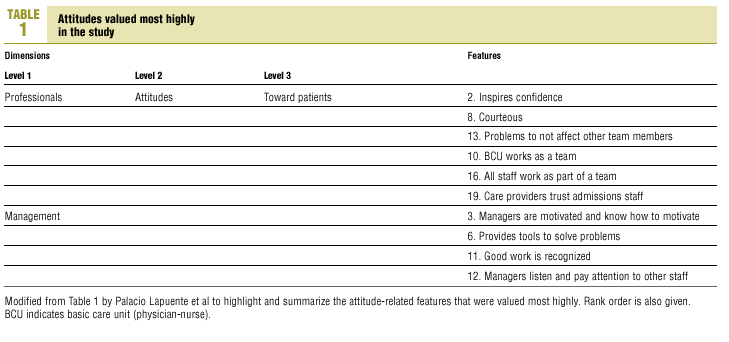Concern over the quality of health services seems to have taken root among us. We have even realized that pursuing* quality is not only a technical matter, but that it involves seeking users´ satisfaction.1 This is a great step forward. But in this process of change, other aspects that also influence the quality of health services are often forgotten. One of these aspects is satisfaction of the workers who provide the service.
*While I realize it may be unorthodox, I adore the word «pursue» with reference to quality: we are always seeking it, yet we never quite achieve it no matter how close we come.
In any enterprise, the results are unlikely to be of high quality if the workers are not satisfied. In the health care sector, quality is impossible without employee satisfaction. Citizens´ satisfaction is a goal of any good health service, and worker satisfaction is a tool to achieve this goal. Workers who does not enjoy their job despite their technical skills are unlikely to be good workers.
As the authors of the article this editorial is about aptly observe, satisfaction is the result of the contrast between what we hope for (expectations) and what we get (the reality we perceive). Studies of workers´ quality of life (perception) have been published;2,3 in general, these reports show that health workers are motivated, although there is some burnout. Features that cause the greatest dissatisfaction are related with the perception of weak managerial support, i.e., when workers feel that their managers do not support and assist them in their work.
Studies of workers´ expectations,4 such as the one published in Atención Primaria, are few. The authors look at employees´ views, and give us an introduction to workers´ expectations regarding their habitual work environment. Like all things in life, the article has some limitations. The study was done in a specific geographical setting, and the opinions reported are likely to have been markedly influenced by the usual working conditions in these areas. For example, if spirometers were generally available in our health centers, we would probably not consider them an important element for our daily work. Moreover, the authors have surveyed three types of worker who responded to the questionnaire (managers, health care providers and admissions staff). The group that provided the largest number of responses was managers (42 questionnaires of a total of 136); we do not know whether there are relevant differences between the responses from each of the three groups, but such differences may exist and may influence the results reported by the authors.
In any case, health care workers are reasonable people! If we look at the features that scored higher than 8.5 (i.e., the 39 top-ranked items), we note that features related with workers´ attitudes clearly predominate: 12 deal with primary care team workers´ attitudes, and 11 deal with managers´ attitudes. The positive features workers identify as being most strongly related with good functioning of the health center are those related with attitudes (Table 1): a good professional attitude (toward both citizens and other workers) and a good managerial attitude are essential elements in our work.
It would be interesting to determine whether workers´ expectations at the Reus and Tarragona primary care centers are similar to those expressed by other primary care teams in Spain; I would venture that expectations do not differ much. It would also be interesting to determine the expectations of admissions staff members regarding physicians and nurses, and the expectations of physicians and nurses regarding managers and colleagues with managerial responsibilities.
However, it would be even more interesting to answer some (or all) of the following questions:
1. If worker satisfaction is indispensable for improving service quality, why do our managers devote so little effort toward it?
2. It seems clear that that workers expect managers to be at «at their service» (just as they themselves «serve» citizens). How many of our managers have been trained in this task?
3. If workers, who know their own job best, realize that their attitude is an essential element for doing a good job, why do they devote so few training resources to this area, and why does training in knowledge and skills continue to predominate?
Our professions (physician, nurse, health care administrator, etc.) require service-oriented attitudes; this orientation is both an aim in itself and a professional reward. Consequently, health care professionals value highly a service-oriented attitude in their managers. They expect their managers to be enthusiastic and competent, humane and respectful, valiant and mature...in short, they want managers they can feel proud of!5 This seems a reasonable and apparently straightforward expectation.
A final word of warning: this editorial is biased. Although the author has held positions of managerial responsibility, I am basically a health care provider. The views of «career» managers may be different.











